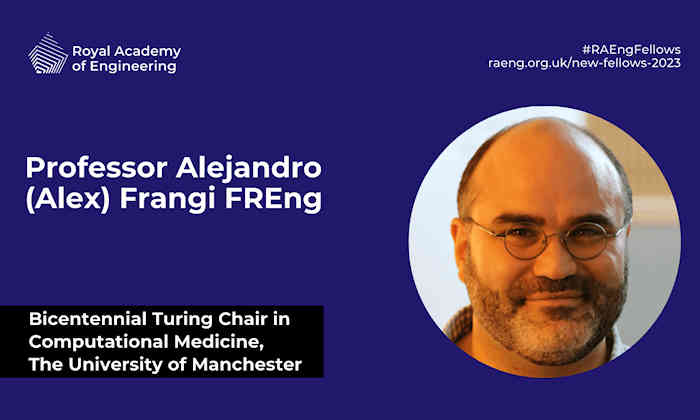Professor Alejandro Frangi becomes a Fellow of the Royal Academy of Engineering
20 Sep 2023
The Royal Academy of Engineering elected 73 new Fellows at its AGM on 19 September.

Congratulations to Professor Alejandro (Alex) Frangi, who is one of the 73 new Fellows in the field of engineering and technology elected by the Royal Academy of Engineering.
The group consists of 60 Fellows, eight International Fellows and five Honorary Fellows, each of whom has made exceptional contributions to their own sector, pioneering new innovations, leading progress in business or academia, providing high-level advice to government, or promoting wider understanding of engineering and technology.
Professor Frangi joined The University of Manchester earlier this year and is the Bicentennial Turing Chair in Computational Medicine. In 2019, Professor Frangi was awarded a Royal Academy of Engineering Chair in Emerging Technologies on Computational Medicine. He holds joint appointments within the School of Health Sciences (FBMH) and the School of Engineering (FSE).
A pioneer of computational medicine, he has made internationally leading contributions in fundamental and translational computational medical imaging and image-based computational medicine. He contributed novel statistical analysis methods to the fields of population imaging (UK Biobank) and in silico clinical trials. His highly interdisciplinary work has been translated to cardiovascular, musculoskeletal, and neurological diseases areas, accounting for over 40% of the NHS expenditure.
The “Frangi filter” (1998) to detect and highlight tubular structures in medical imagery is a classical tool in image processing with impact across many imaging manufacturers (e.g., Phillips, Siemens, GE), software companies (e.g., Perspectum Diagnostics) and widely available across multiple open-source libraries.
More recently, Professor Frangi’s work in hemorrhagic stroke combining digital twins and regulatory science culminated in the first in silico trial of a Medtronic flow diversion device for treating intracranial aneurysms showed the possibility of replicating and expanding findings in three randomised controlled trials or international registries for a fraction of their cost and increased thoroughness testing effectiveness and safety.
Professor Frangi is also engaged in government policy and regulations. He advises the Office of Life Sciences (OLS) and the Medicines and Healthcare products Regulatory Agency (MHRA) in the areas of AI in medicine and non-animal and non-human alternatives to generate regulatory evidence. He initiated and led the InSilicoUK Pro-Innovation Regulations Network, a community think tank with about 2000 members from industry, academia, NHS, regulators, and funders. He led the UK landscape report on in silico regulatory evidence and the first UK economic impact assessment of these technologies.
These significant contributions have been recognised with several awards, among which are the NC3R Honourable Mention (2023), IEEE EMBS Technical Achievement Award (2021), and the IEEE EMBS Early Career Award (2006). His research group’s work has led to two spin-offs: GalgoMedical (2013) and adsilico (2022).
Commenting on the Royal Academy’s announcement Alex said: “I am thrilled and humbled by this privilege and honour. I want to thank the nominators and colleagues who made this possible. Through its fellowship, the Royal Academy of Engineering provided me with career-defining mentoring and essential opportunities for the past four years. I have excellent Fellow role models that have inspired me. Hence, I would like to help advance our profession through developing the next generation of interdisciplinary engineers and daring entrepreneurs on which the future vibrancy of our discipline, the Academy and the UK will depend.”
This year the Royal Academy of Engineering’s new Fellows continue to reflect the Academy’s ongoing Fellowship Fit for the Future initiative announced in July 2020, to drive more nominations of outstanding engineers from underrepresented groups ahead of its 50th anniversary in 2026. This commits the Academy to strive for increased representation from women, disabled and LGBTQ+ engineers, those from minority ethnic backgrounds, non-traditional education pathways and emerging industries, and those who have achieved excellence at an earlier career stage than normal.
Professor Sir Jim McDonald FREng FRSE, President of the Royal Academy of Engineering, said: “Engineering is everywhere, but nowhere the same, and our new Fellows represent the great breadth and diversity of engineers who are striving to address some of the world’s most complex challenges – benefiting society and the economy in the process. From next generation power networks and water systems to quantum computing and artificial intelligence, our new Fellows are shaping the future.
“We live in an era of rapid change across our communities, our country, and of course our planet. Today, we welcome to our Fellowship an inspiring group of people who are harnessing their creativity, courage and commitment to drive positive change in the world around us and we look forward to their contribution to our work.”
Alex will be attending a special ceremony in London on 28 November when the new Fellows will be formally admitted to the Academy, each signing the roll book. In joining the Fellowship, they will lend their unique capabilities to achieving the Academy’s overarching strategic goal to harness the power of engineering to create a sustainable society and an inclusive economy for all.
View the complete list of the Fellows elected in 2023.
